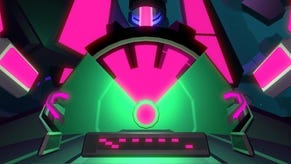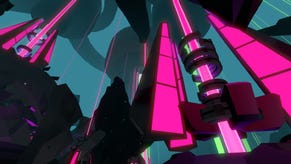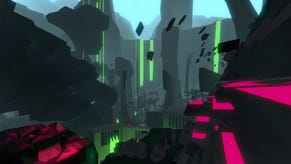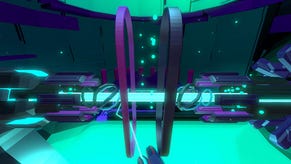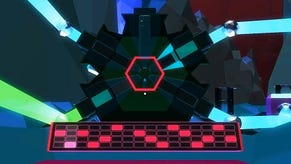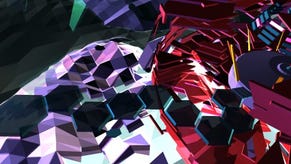Impressions: FRACT OSC
Mystron
FRACT OSC is a semi-open world puzzle game themed around electronic music. It looks like Tron with more dodecahedrons and sounds like some impossibly cool Berlin club only 12 people have ever heard of. It's out tomorrow, but I spent a few days with it last week.
Ultimate first-world problem: I didn't find FRACT particularly enjoyable until I played it on a biggish telly with some reasonably capable speakers attached.
Before that, I trudged through its Tronish world aware that I was expected to be awed by the towering abstract shapes around me, transported to somewhere by its looping, languid beats and blinking lights, but my feelings stopped short at cool admiration, not quite progression to the wonder I wanted to experience.
God, I worried about myself. I thought about those I'd harangued for saying how Audiosurf left them cold, or how Proteus was boring. Was this how it felt to be on the other side, to be resentful that I didn't click with something sensory that other people took to their hearts?
Two truths should be told here. The first is that I have no idea how others are going to respond to FRACT, as it isn't out yet, but its website is festooned with enough awards to suggest that the game's got under the right skin somewhere.
The second is that, even once FRACT's scenery was made genuinely massively and its customisable soundscape was booming around me rather than squeaking through earphones, I liked it more but still didn't love it. Every time I thought about going back to it, I felt disconcertingly similar to how I do when I gaze at a stack of unwashed dishes in the sink.
A gamepad helped too. This is a languid game that's far better suited to leaning back than hunching forwards. It wants to wash over you, and I got more out of it when I let that happen.
On a bigger screen that happened - its architecture towered over me and enveloped me, and I felt transported rather than merely observing. Twisting paths of light, enormous suspended dodecahedron (maybe - I didn't count the sides), trails of glowing jewels, vast and impossible turbines powering a sleeping world back into life: as a pure tour (and with the above qualifiers) FRACT is a beautiful creature.
Thing is, it isn't a tour. It's a puzzle game, in the Myst vein but nowhere near so obtuse or painstaking. Puzzles are often elaborate, but they involve stuff like rotating massive floating discs in order to orientate a vast beam of light in the correct direction across the sky, or rotating parts of a circuit board to carry a beat into an alien engine. Solutions are precise and unforgiving, but the difficulty stems more from slowly learning the game's wordless language than the actions required.
Once you've worked out what the game is trying to tell you using light and sound, acting on what you've learned is reasonably straightforward (although it's far fiddlier than it needs to be as a result of a retrograde 'interaction mode' activated with the right mouse button, which adds oft-annoying over-complication apparently purely to keep the standard view as minimalist as possible).
Dials must be turned, pipe-pieces must be rotated, light-beams must be aligned: again, the trick is deciphering wordless language, assessing what's around you and seeing how the world shifts when parts of it are fiddled with. To some extent this is a matter of gazing at everything in interaction mode until you spy the only usable items in the area, but although FRACT strives to make each puzzle different, a common visual dialect establishes itself and often enough it's immediately obvious what you'll be tinkering with.
I'm afraid to say that, while many of these puzzles could be said to be ingenious, I did tend to find them something of a chore. Here's where I admit that I bounce off Myst games for similar reasons. FRACT and Myst have a lot in common, even if this is by a big margin prettier, stranger and cooler. Puzzles are guided by audio cues (a pounding beat that locks in when a series of parts are correctly aligned, or a row of doors which open and close to match the rhythm ) so there's an instinctive, self-contained quality to them.
You fiddle and you learn the language and you see what happens, and eventually it clicks into place - a far cry from memorising piano key positions. The visual and sonic results of solving puzzles can be dramatic too, as darkened places spring into urgent life - again, FRACT achieves everything wordlessly, and somehow that makes for a more satisfying, more personal outcome than written or spoken messages could.
Even so, there is that sense that a journey of wonder is being repeatedly interrupted by busywork. After a time, the thought of going back to it seemed faintly oppressive even though I wanted to admire more of its light-fantastical world, and that's why I hesitantly settled on calling this piece 'Impressions' not 'Wot I Think.'
What I think is I'd like FRACT more if it was a Going For A Walk game peppered by various buttons to press to create beats and loops and other things that a DJ might say. Proteus in an avant-garde night club, basically - but then The Game Police might come for it. For all FRACT's weird-beard presentation, its being so puzzle-centred means I don't believe it contravenes any of those cheerless, unforgiving Not A Game laws.
I suppose I should talk about the music generation element. As you solve areas you unlock new elements for a music sequencer meta-game, where you can create music of your own in an easy, immediate, kinda cool system that I'm going to sweepingly generalise as "like Daft Punk redesigned Garage Band".
Throughout the main game you're doing elements of this anyway, but returning to the 'studio' every time you complete a room and unlock a new system and seeing what it adds to your ad-hoc tunes is a great way of feeling you're gradually adding life to this strange, cold place. It's a fine music toy in its own right, even where the surround semi-open world and its puzzles removed.
There is a haughtiness to the whole affair though - its music didn't ever move me, fill me with life, but instead seemed to declare 'hey look how cool this is' as it throbbed and pulsed around FRACT's neon scenery. It's that as much as tiring of Pipemania-derived puzzles which eventually stopped me returning to an otherwise fascinating world - a certain coldness, an absence of joy or celebration, a degree of posturing.
FRACT is a beautifully strange-looking game, and that big telly and speakers certainly made it look and sound more vital, but after a few hours I could no longer tell just what it was I was trying to commune with. I was consistently impressed by FRACT, but it couldn't quite find a way into my withered, ashen heart.
FRACT OSC is out tomorrow.









